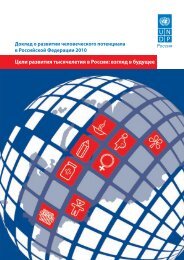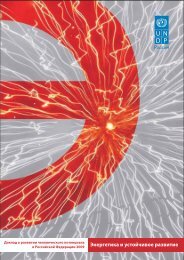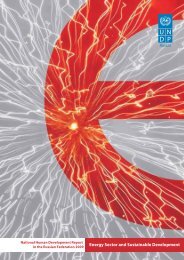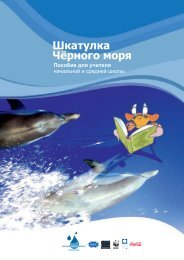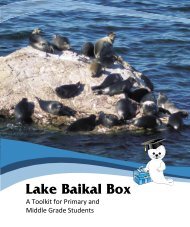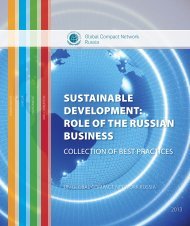Report - UNDP Russia
Report - UNDP Russia
Report - UNDP Russia
Create successful ePaper yourself
Turn your PDF publications into a flip-book with our unique Google optimized e-Paper software.
elimination of structural and territorialimbalances and creation of new jobs. Moderateand flexible re-distributive policy should providecitizens with equal rights for their developmentand preservation of their human potentialwithout destroying incentives provided by themarket economy. This mostly means governmentsupport for the education and health caresectors, combined with smooth development ofmarket mechanisms within these sectors.1.4. Development scenariosfor the fuel & energy sectorin the context of the economicdevelopment modelThe economic crisis has had severeimpact on the <strong>Russia</strong>n economy, but it can beregarded as a window of opportunity both foradjustment of state economic policy and for realchanges in the national economy. Theopportunities arise from reduction of naturalresource rent and devaluation of the nationalcurrency, which create opportunities fordomestic industrial and agriculturalmanufacturers, but, most of all, from a newunderstanding in <strong>Russia</strong>’s government andbusiness establishments of the fragility of suchprosperity as has been achieved to date. Thesefactors in combination could promote realchanges in the growth and development featuresof the <strong>Russia</strong>n economy.Although diversification of the nationaleconomy is an important objective, <strong>Russia</strong>’s fuel& energy sector as such has a crucial role in thepositive development scenario, which has justbeen outlined, because of its scale and its role asa energy supplier to all other sectors. We look atseveral possible scenarios for development of<strong>Russia</strong>’s fuel & energy sector in the context ofnational economic development.The scenarios we propose are slightlydifferent from those reviewed in the Long-termDevelopment Concept for <strong>Russia</strong> up to 2020(approved in September 2008) and theaccompanying Social and EconomicDevelopment Forecast 5 . These differences are dueto impact of the world economic crisis onprogress of the national economy and somedivergences in assessment of the developmentpotential of <strong>Russia</strong>’s fuel & energy sector. Possibleconsequences of the global recession and theeconomic crisis for the <strong>Russia</strong>n economy cannotbe fully gauged at present, and scenarioparameters will have to be amended in the future.Implementation of the innovationscenario (the main scenario in the Long-termDevelopment Concept), which calls for adramatic increase in the level of structuraldiversification of <strong>Russia</strong>’s economy up to 2020,now looks unlikely. Several years will be requiredto overcome the crisis and to restore the nationaland global economy, so the innovativebreakthrough stage, foreseen in the Concept, willbe postponed. In this Chapter it is assumed thatthe diversification scenario will not be realizeduntil after 2020.However, innovation processes could bewell underway by 2020 in the traditionallydominant fuel & energy sector. The second of thethree scenarios outlined below, is our owninnovation scenario where the key role is playedby increasing energy efficiency (probably to alevel corresponding to the innovative scenario inthe Long-term Concept) and development ofnew technologies in the fuel & energy sector.Inertial scenarioIn such a scenario global demand forenergy resources would remain fairly strong inthe post-crisis recovery stage. High earnings fromexports of oil & gas are capable of maintainingthe fuel & energy sector and the <strong>Russia</strong>neconomy as a whole. It is therefore possible thatneither the state nor big business will implementa serious innovation policy (despite frequentdeclarations). This could lead to:5http://www.economy.gov.ru/wps/wcm/myconnect/economylib/mert/welcome/economy/strategyandinnovation/longtermstratdirectarea/21



